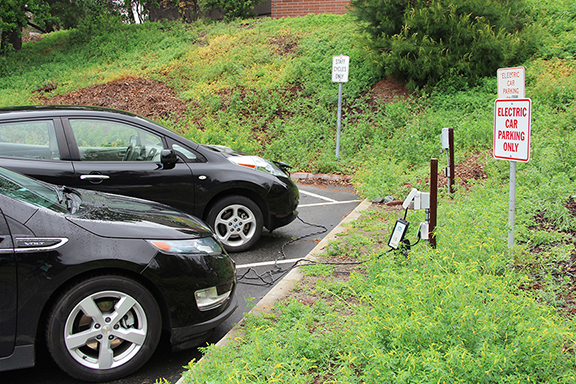DVC in need of charging outlets for the increased number of electric vehicles

A Chevy Volt and Nissan Leaf charging in lot 4 at the only electric car outlet on campus.
April 18, 2017
The time has come for electric vehicles to have more than two available charging outlets at Diablo Valley College.
DVC currently has two 120v outlets and one 240v located amid faculty parking in lot four, providing accommodation for only two electric vehicles (EVs) at a time. The outlets are often occupied for substantial periods of time – a single electric vehicle can take up to 12 hours to fully charge.
“I purchased my vehicle (Chevy Volt) in January,” DVC chemistry instructor Wayne Larson said.
“I had previous knowledge of the charging outlet that was available because for the past 20 years I’ve used this parking lot. However I am aware that a lot of people are unaware of the outlet.”
According to the Department of Energy, the technologies that power electric vehicles have been in development since the 19th century, with the first fully electric car making its debut in the United States in 1890. The technology failed to catch on, with high costs playing a prohibitive role in the mass manufacturing and adoption of electric vehicles.
Fast forward to today, and the tides seem to finally be turning. Green Car reports that over 184 thousand electric vehicles have been sold in California since 2011, which has lead to a higher demand for charging outlets throughout the state, including here at DVC.
According to the PlugShare app, which locates nearby charging outlets and stations for EVs, the closest outlet to DVC is located at Meson Azteca Mexican Cuisine on Morello Avenue, 0.7 miles from campus.
DVC’s sustainability tour map notes plans to add an additional three charging outlets to other lots around campus but that plan has yet to be finalized.
The addition of more standard outlets on campus will be an answered prayer for student and staff EV owners. However, a level two charging station would perhaps make more sense.
The average outlet has a 120 voltage, costs about $100 to install and has an average electricity cost per car of $0.50. Expected charging time ranges from eight to 12 hours.
A level two charging station is a little more pricey, with an average installation cost of about $2,000 and an average electricity cost per car of $2.00. Although its expected charge time is drastically shorter at two to four hours.
“I have noticed an increasing number of EV vehicles in the staff parking lots whose owners would appreciate and need an opportunity to charge,” Fred Kennedy, DVC Computer Science Instructor said.
“To meet these needs DVC needs to install at least eight level two charging stations to help meet the needs of faculty and staff,” Kennedy said.
Perhaps a few level two charging station should be considered for the overflow parking lot, coupled with an enforced time limit to encourage a fast turnover for student EV owners.
California’s Bay Area Air Quality Management District offers $4 thousand in tax credit per level two charging station to offset some of the cost of purchasing and installing the station.
In an emailed response to the concerns of DVC math instructor Peter Willett, Interim President Ted Wieden said, “we are committed to either upgrading the existing EV charging stations or installing new stations. Once we develop a scope of work, we will solicit bids from vendors that are already on file with District Purchasing.”
Other community colleges such as, Laney, Merritt, and De Anza have all been successful in installing the proper charging stations to accommodate the student and staff EV owners.
“I would like to see DVC do the same,” Willett said.





































































